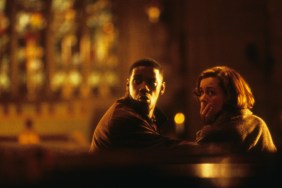
Opening with “Once upon a time…” slowly scrawled on the screen in a child’s hand, we’re immediately expected to think of Mama as a fairy tale. Wasting no further time, the story is underway in the midst of the financial crisis. A father has killed two of his co-workers, heads home, kills his wife, kidnaps his two young daughters and heads for the hills. Here, things take a quick, but inevitable turn.
A snowy road and the father’s on-edge demeanor cause him to lose control of the car, sending it sliding off the road and down a small cliff. Bleeding, he emerges and staggers through the woods with his daughters in tow when they come to a small cabin in the woods. They enter, bad things happen.
As movies are wont to do, we flash five years into the future where the girls’ uncle, Lucas (Nikolaj Coster-Waldau), has not given up the search for his brother or his two nieces. A discovery is made.
Victoria (Megan Charpentier) and Lilly (Isabelle Nélisse) are found in the cabin where they’ve been living for the past five years, cared for by an overprotective, CGI ghost with a large supply of cherries. Their father, however, is gone.
Obtaining custody, Lucas and his rock band girlfriend (Jessica Chastain in a black wig), make a deal and are given a house to stay in as part of an agreement. The deal, the girls’ doctor (Daniel Kash) can continue his tests on their girls’ odd behavior. They are frequently seen talking to the walls, shy from human contact, Lily can hardly speak and they both continue referring to someone, or thing, as “Mama”.
You’ve seen some variant of this movie before. Once the story begins, director Andrés Muschietti isn’t breaking new ground. You have little kids seeing a ghost, one character has a history with a mental hospital, a doctor is trying to advance his career by not letting on all he knows and then you have the adoptive parents with issues of their own. The only real difference from other films of this sort is the ending and as much as Muschietti wanted me to think I was seeing something heartfelt, I just didn’t see it that way.
With Mama positioning itself as a fairy tale, it clearly wants to maintain that status and be respected as something more than “just a horror film”. Yet, all throughout, in order to keep the audience engaged it falls back on jump scares or characters making stupid decisions to keep the tension high. It does this to such a degree that a woman behind me in my screening looked on at one character’s decision and said, “What a stupid, stupid man.” Once his fate was sealed, she repeated, “What a stupid man.” I agreed.
Admittedly, a few scenes in Mama do have legitimate scares, but they’re either lodged into the narrative for scares alone or their fright factor is ratcheted up due to an amplified soundtrack. No real sense of dread is ever felt. Then again, perhaps that’s because the supposedly scary being is a computer generated creature lacking in any measure of realism or humanity.
Then comes the ending, which I was never bought into for several reasons, one of which being the over abundance of CGI used to create the titular “Mama”. If I was meant to feel any level of emotion for the mess of pixels up on the big screen representing the goblin of a woman terrorizing all 100 minutes of this picture then it was lost on me. I could see the direction the story was going, but you can’t go from being the snarling mouth in the corner of the closet that emerges from the black wound in the wall to anything more than a villain and expect me to care.
Muschietti adapted Mama from his 2008 short film of the same name (watch it here), co-writing with Neil Cross and his sister, Barbara. The short film is merely a brief scene that is duplicated again in the feature version, but both the short and the feature film do show off Muschietti’s talent for camerawork and atmosphere. Mama is adeptly made, but the story falls short.
This is yet another installment in the “Presented by Guillermo del Toro” brand and it appears that brand may be a one-and-done effort. After the excellence delivered by The Orphanage in 2007, both Don’t Be Afraid of the Dark and now Mama promised a lot more than they ultimately deliver. Mama may be a tick better than Don’t Be Afraid of the Dark, but I couldn’t find an avenue to connect with it, though I’m sure some will.
Considering the maternal narrative some viewers may find a connection, and some may also not be as bothered by the silly digital effects as I was. Either way, if you want to make a lyrical fairy tale then make one, don’t try to wedge in jump scares and loud noises to keep the audience on edge, it just gets in the way and prevents the film from reaching its end goal. Muschietti has a clear talent for atmosphere, but he gives up on it in favor of more traditional storytelling tropes causing Mama to dissolve into an amalgam of good and bad, erring on the side of bad.







